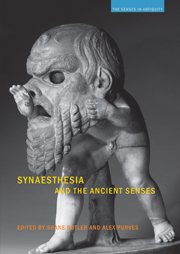Book contents
- Frontmatter
- Contents
- Contributors
- Introduction: synaesthesia and the ancient senses
- 1 Why are there nine Muses?
- 2 Haptic Herodotus
- 3 The understanding ear: synaesthesia, paraesthesia and talking animals
- 4 Aristophanes, Cratinus and the smell of comedy
- 5 “Looking mustard”: Greek popular epistemology and the meaning of δριμύς
- 6 Plato, beauty and “philosophical synaesthesia”
- 7 Manilius' cosmos of the senses
- 8 Reading death and the senses in Lucan and Lucretius
- 9 Colour as synaesthetic experience in antiquity
- 10 Blinded by th light: oratorical clarity and poetic obscurity in Quintilian
- 11 The sense of a poem: Ovids Banquet of Sence (1595)
- 12 Saussure's anaphonie: sounds asunder
- 13 Beyond Narcissus
- Bibliography
- Index
13 - Beyond Narcissus
- Frontmatter
- Contents
- Contributors
- Introduction: synaesthesia and the ancient senses
- 1 Why are there nine Muses?
- 2 Haptic Herodotus
- 3 The understanding ear: synaesthesia, paraesthesia and talking animals
- 4 Aristophanes, Cratinus and the smell of comedy
- 5 “Looking mustard”: Greek popular epistemology and the meaning of δριμύς
- 6 Plato, beauty and “philosophical synaesthesia”
- 7 Manilius' cosmos of the senses
- 8 Reading death and the senses in Lucan and Lucretius
- 9 Colour as synaesthetic experience in antiquity
- 10 Blinded by th light: oratorical clarity and poetic obscurity in Quintilian
- 11 The sense of a poem: Ovids Banquet of Sence (1595)
- 12 Saussure's anaphonie: sounds asunder
- 13 Beyond Narcissus
- Bibliography
- Index
Summary
A key text of twentieth-century thought went missing decades ago. More mysterious than the loss itself has been our indifference to it: the affair was never widely publicized, and even those in the know have tended to regard the disappearance as a bibliographic curiosity rather than as reason for serious regret. I am referring to Jacques Lacan, “The Mirror Stage”. To be clear, I do not mean Jacques Lacan, “The Mirror Stage as Formative of the I Function as Revealed in Psychoanalytic Experience”, delivered on 17 July 1949 to the Sixteenth International Psycho-Analytical Congress in Zurich and published the same year in the Revue Française de Psychanalyse. I mean instead the earlier version with the shorter title, sometimes said to have been published in 1937, among the acts of the Fourteenth Annual Psycho-Analytical Congress in Marienbad, in The International Journal of Psycho-Analysis, vol. 18. What one actually finds here, on page 78, sandwiched between summaries of papers on “The Dynamics of Puberty” and “The Early Diagnosis of Psychoses in Analysands”, is only this brief notice: “2. Dr. J. Lacan (Paris). The Looking-Glass Phase”. And that is all.
This part of the mystery, at least, is easily solved: Lacan himself, en passant in later writings, admits to being the immediate culprit, though he assigns ultimate blame to Ernest Jones, President of the Congress, “a position for which he was no doubt qualified by the fact that I have never encountered a single English colleague of his who didn't have something unpleasant to say about his character”.
- Type
- Chapter
- Information
- Synaesthesia and the Ancient Senses , pp. 185 - 200Publisher: Acumen PublishingPrint publication year: 2013



